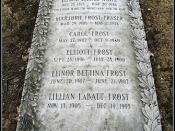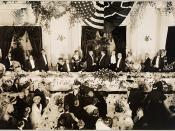As a whole, America has lived through every aspect of prejudices and racism. Fortunately, as educated and open-minded people of the United States, we've taken the bad and turned it into an object to grow and learn upon. In Raymond Carver's short story, Cathedral, the narrator, here and after referred to as "ÃÂBub', allows his own prejudices to keep him from seeing the whole picture of his wife's blind friend.
Carver's Cathedral boldly illustrates why people should not be prejudice. Throughout the story, Bub is overtaken by the thought of a blind man, Robert, in his house. His image of the man has been shaped by "movies [where] the blind moved slowly and never laughed"� (163). As Bub and Robert bond, Bub realizes that Robert was as ordinary as any other man but without a working set of eyes. Upon the close of the story, Bub and Robert join-draw a cathedral by overlapping hands.
Bub felt as if "it was like nothing else in [his] life"� (172) where as before he uttered at the thought of a blind-man sleeping in his house. The Cathedral is a perfect example why prejudicism only prevents a person from growing instead of opening themselves to the life around them.
Bub is a man of intense inner feelings and thoughts. Prior to engaging in conversation with Robert, Bub feels as if the conflict lies between himself and the blind man. "A blind man in [his] house was not something [he] look forward to"� (163). The true conflict lies between Bub and himself for it is he who will not allow himself to open his mind and accept difference in other people. Although selfish at first, maintaining his only Hollywood image of a blind man, Bub finally overcomes his prejudice and accepts Robert for...


